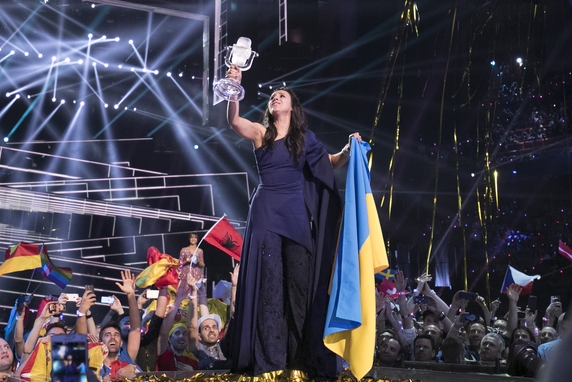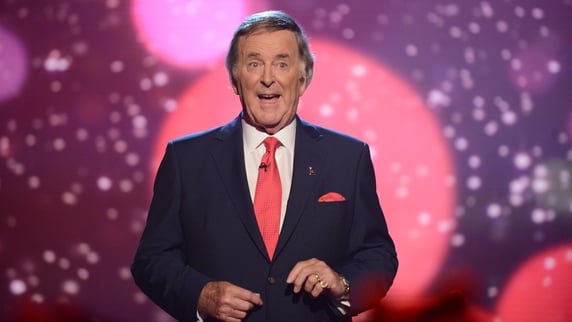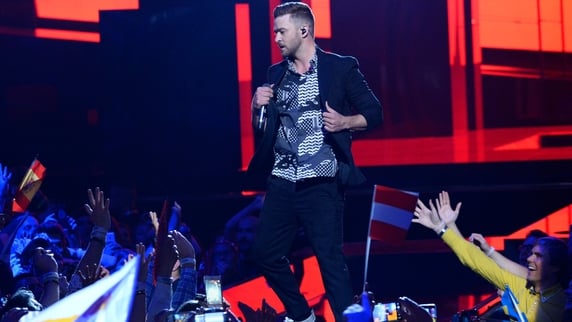Ukraine's Jamala struck a surprise gold in the Eurovision Song Contest with a song '1944' about war-time deportations of Crimean Tatars by the Soviet Union in one of the most controversial winners in the competition's history.
In a show known down the years for its playfulness and camp, 32-year-old Jamala struck a sombre tone with her lyrics about strangers coming to "kill you all", in reference to the forced removal of ethnic Tatars by Josef Stalin during World War II.
Jamala, herself a Tatar, stood on the Stockholm stage singing "you think you are gods" against a blood-red backdrop.

After accepting the Eurovision trophy, she said: "I know that you sing a song about peace and love, but actually, I really want peace and love to everyone."
Thrusting the glass microphone in the air she yelled: "Thank you Europe - welcome to Ukraine."
Hosts Petra Mede and Mans Zelmerlow welcomed the audience to the Globe Arena in Stockholm, Sweden, with a reminder that the competition was founded in 1954 after Europe had been ravaged by war.
Zelmerlow said: "Once again, Europe is facing darker times."
Mede added: "Now we set aside any differences we have."

Terry Wogan
BBC presenter Graham Norton led a toast to his predecessor Terry Wogan during song number nine - host country Sweden's entry, If I Were Sorry, performed by Frans.
Wogan was the BBC's Eurovision commentator for almost 35 years.
Norton said during his commentary: "Eight years ago, when I was lucky enough to get this job of commentating, Sir Terry very kindly and graciously phoned me, and the only bit of advice he had for me was 'Don't have a drink before song nine'. Well this is song nine."
He added: "So while the crowd here in the Globe Arena cheer on their home boy, I would urge you back in the UK at home to raise a cup, a mug, a glass, whatever you have in front of you, and give thanks for the man who was, and always will be, the voice of Eurovision, Sir Terry Wogan. Sir Terry, this is song nine."
Australia, which had been invited to participate for a consecutive year after joining the show as a one-off in 2015 to celebrate the event's 60th anniversary Building Bridges theme, was an early favourite with singer Dami Im performing Sound Of Silence.
The country had the same rights as any other competing country, with votes from a professional jury and the voting public contributing to the final scoreboard.
Russia, also a favourite to win, put in an impressive performance, with Sergey Lazarev singing You Are The Only One with huge black wings projected behind him.
Justin Timberlake provided half-time entertainment during the competition, opening his special guest performance with his hit Dance With Me before moving on to his new single Can't Stop The Feeling.

While the Eurovision voting has long been tainted by political alliances among competitor countries, songs are not allowed to be political. Jamala's entry seemed to come close to breaking that rule.
Event organiser, the European Broadcasting Union, said Ukraine's offering did not contain political speech and therefore did not break Eurovision Song Contest rules.
"The song refers to a historical fact and Jamala makes reference to a story that happened in her family," EBU Director General Ingrid Deltenre said.
She said the song referred to what happened in 1944 and not recent events. Crimea was annexed from Ukraine by Russia in 2014.
At a press conference, Jamala appeared to struggle with tears when she talked about a close relative that the song was about.
"I would prefer that all these terrible things did not happen at all to my great-grandmother and I would even prefer this song not to exist," she said.
Bookmakers had tipped Russia to win the competition followed by Australia and Ukraine at number three.
Russian contestant Sergey Lazarev played down any political implications of Ukraine's victory.
"I am trying to think that it is all about music and not about politics. We are at a song contest, not a political one," Lazarev told reporters after the contest was over.
As late as last year, Ukraine decided not to take part in Eurovision with war again ravaging the country as troops take on Russian-backed rebels.

